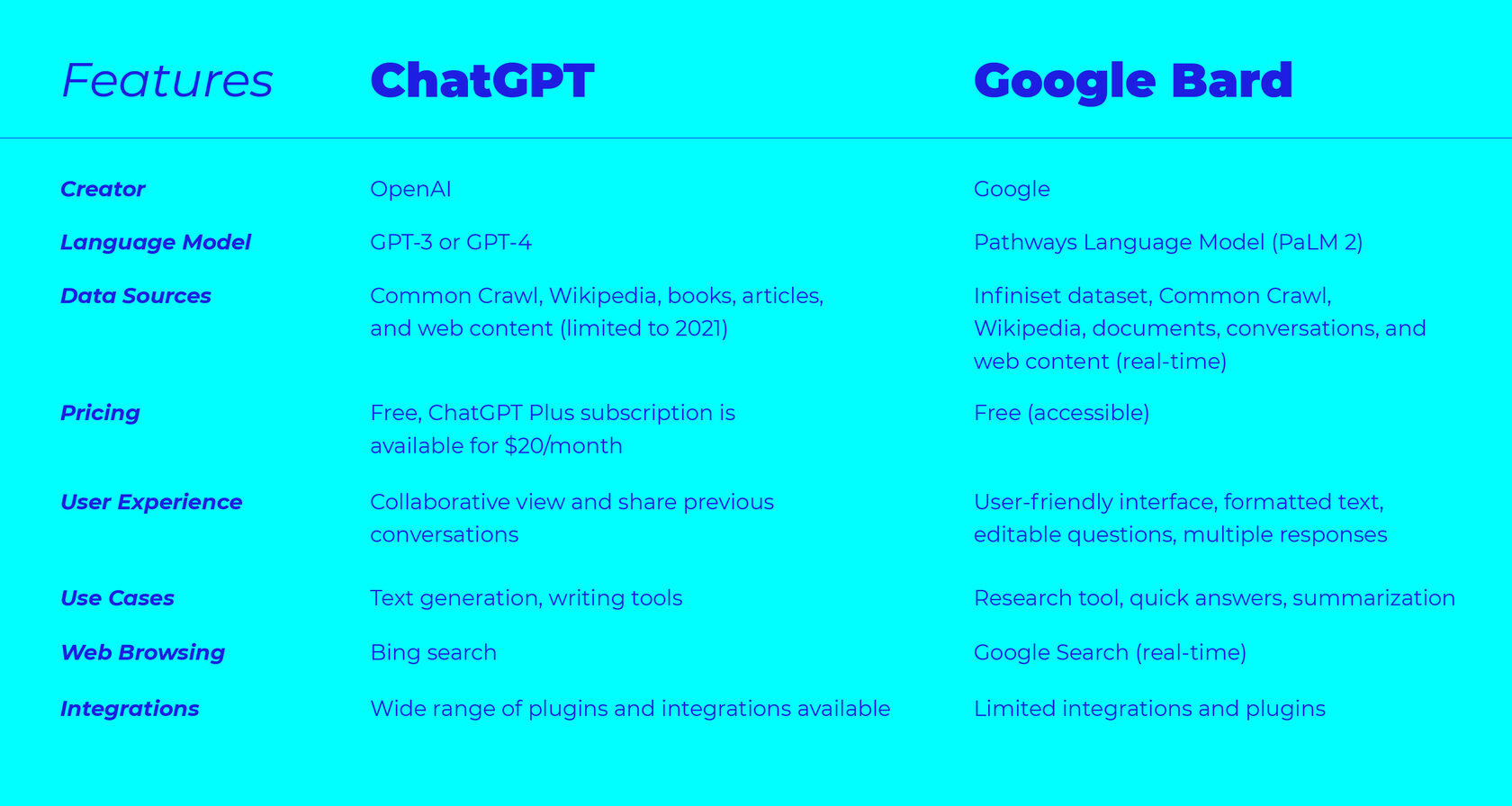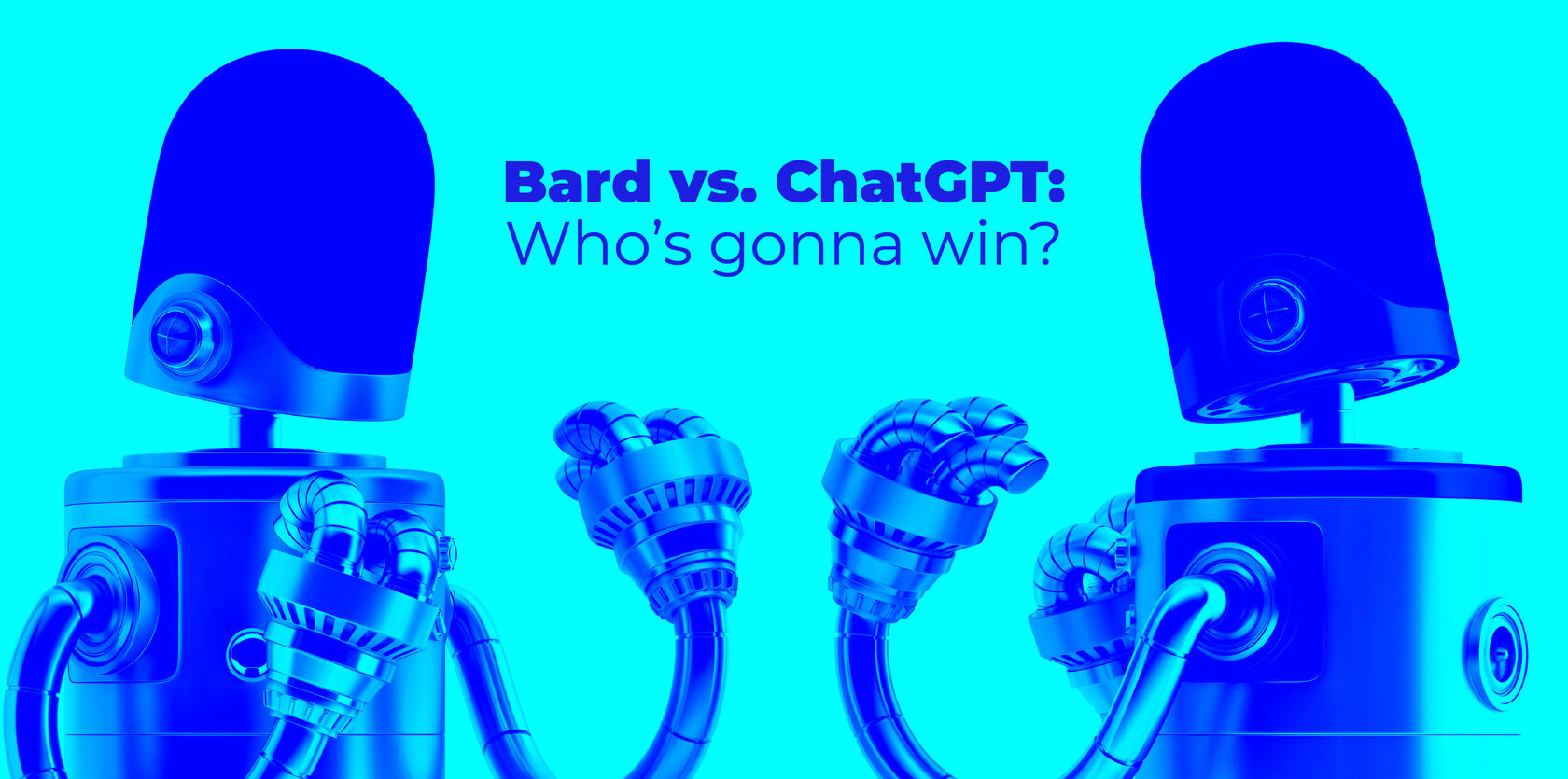It has been a couple of months since ChatGPT made a boom in the digital world with its conversational AI, revolutionizing the way businesses interact with their customers. Since then, dozens, if not hundreds, of AI-based tools have emerged in the digital environment, promising to change our lives, or at least the way we do our jobs. Everyone thought Google was losing the battle of being the leader in search, and SEO specialists predicted ChatGPT would replace Google Search. It was until Google presented Bard, a new (still experimental) conversational AI. Those who have been actively using ChatGPT are now testing Bard and finding advantages, but which one is actually better, or can we compare these two? Let’s try.
Before digging deep into comparisons and use cases, here is a quick comparison of ChatGPT and Bard.
Before digging deep into comparisons and use cases, here is a quick comparison of ChatGPT and Bard.

ChatGPT: A powerful text generator
ChatGPT, created by OpenAI, is built upon the Generative Pre-Training Transformer (GPT) architecture. Its training data consists of a vast text corpus from diverse sources such as Common Crawl, Wikipedia, books, articles, and web content. However, it's important to note that the training data for ChatGPT ends in 2021 (updates promise to be connected to the internet and crawl the web in real-time), limiting its knowledge of the latest world events and research. ChatGPT loses when asked to give precise data and statistics, and the answers may be vague. Meanwhile, ChatGPT's standout feature is its proficiency as a text generator and writing tool. It excels in brainstorming blog ideas, writing long-form articles or emails, and content marketing. While you read this article, ask yourself who was standing behind this text, a human, or ChatGPT. Today, it may be pretty hard to detect human touch unless you are proficient in reading subtext. We can still use this trick until AI learns and wins over it.
ChatGPT, created by OpenAI, is built upon the Generative Pre-Training Transformer (GPT) architecture. Its training data consists of a vast text corpus from diverse sources such as Common Crawl, Wikipedia, books, articles, and web content. However, it's important to note that the training data for ChatGPT ends in 2021 (updates promise to be connected to the internet and crawl the web in real-time), limiting its knowledge of the latest world events and research. ChatGPT loses when asked to give precise data and statistics, and the answers may be vague. Meanwhile, ChatGPT's standout feature is its proficiency as a text generator and writing tool. It excels in brainstorming blog ideas, writing long-form articles or emails, and content marketing. While you read this article, ask yourself who was standing behind this text, a human, or ChatGPT. Today, it may be pretty hard to detect human touch unless you are proficient in reading subtext. We can still use this trick until AI learns and wins over it.
Google Bard: Research tool extraordinaire
Developed by Google, Bard utilizes the Pathways Language Model (PaLM 2) and draws upon a diverse range of data sources, including Common Crawl, Wikipedia, documents, conversations, and dialogues from the web. What sets Bard apart is its real-time access to Google Search, enabling it to provide the latest information and research on various topics. Being connected to Google Search makes Bard a winner so far, but as long as it is still experimental and falls short when generating compelling text, we won’t give up on ChatGPT.
Bard's strength lies in its role as a research assistant. It can offer brief answers and summaries based on the most relevant information from the web.
As an advanced user, you can make Bard give precise answers and provide these answers to ChatGPT to reformulate and pack beautifully.
Developed by Google, Bard utilizes the Pathways Language Model (PaLM 2) and draws upon a diverse range of data sources, including Common Crawl, Wikipedia, documents, conversations, and dialogues from the web. What sets Bard apart is its real-time access to Google Search, enabling it to provide the latest information and research on various topics. Being connected to Google Search makes Bard a winner so far, but as long as it is still experimental and falls short when generating compelling text, we won’t give up on ChatGPT.
Bard's strength lies in its role as a research assistant. It can offer brief answers and summaries based on the most relevant information from the web.
As an advanced user, you can make Bard give precise answers and provide these answers to ChatGPT to reformulate and pack beautifully.
User experience and additional features
When it comes to user experience, Google Bard surpasses ChatGPT with its user-friendly interface and formatted text that is easy to scan. Bard allows users to edit questions after they are asked and provides multiple responses with clear CTAs to "Google it" for source confirmation. ChatGPT’s latest update already has this feature. Integration with Google Workspace streamlines the process of uploading Bard's responses to Gmail or Google Docs.
On the other hand, ChatGPT offers a collaborative experience with the ability to view and share previous conversations. This makes it a suitable choice for teamwork and knowledge-sharing (unless you want your coworkers to know you are using ChatGPT). Furthermore, ChatGPT offers a range of plugins and integrations, expanding its capabilities beyond simple conversation generation.
Both tools evolve and change, getting better and more user-friendly. And we are getting more capricious.
When it comes to user experience, Google Bard surpasses ChatGPT with its user-friendly interface and formatted text that is easy to scan. Bard allows users to edit questions after they are asked and provides multiple responses with clear CTAs to "Google it" for source confirmation. ChatGPT’s latest update already has this feature. Integration with Google Workspace streamlines the process of uploading Bard's responses to Gmail or Google Docs.
On the other hand, ChatGPT offers a collaborative experience with the ability to view and share previous conversations. This makes it a suitable choice for teamwork and knowledge-sharing (unless you want your coworkers to know you are using ChatGPT). Furthermore, ChatGPT offers a range of plugins and integrations, expanding its capabilities beyond simple conversation generation.
Both tools evolve and change, getting better and more user-friendly. And we are getting more capricious.
Limitations and areas for improvement
Both ChatGPT and Bard have their limitations. ChatGPT can sometimes struggle with logical reasoning and may generate incorrect responses. So human! While Bard excels at summarizing complex web content, ChatGPT's summarization capabilities require manual input of the article's text. Bard's real-time access to Google Search gives it an edge in terms of recent information, but ChatGPT Plus can leverage Bing Search to overcome its limitation of data ending in 2021.
Both ChatGPT and Bard have their limitations. ChatGPT can sometimes struggle with logical reasoning and may generate incorrect responses. So human! While Bard excels at summarizing complex web content, ChatGPT's summarization capabilities require manual input of the article's text. Bard's real-time access to Google Search gives it an edge in terms of recent information, but ChatGPT Plus can leverage Bing Search to overcome its limitation of data ending in 2021.
ChatGPT vs. Bard; who is the winner?
Let’s hope, a human will still be the winner because, as long as AI lacks functionality and power, we can sleep peacefully. But seriously, if you use both tools wisely, you will win the game. Choose between these platforms based on specific needs and preferences, such as writing assistance or real-time information retrieval, and never forget about critical thinking.
Let’s hope, a human will still be the winner because, as long as AI lacks functionality and power, we can sleep peacefully. But seriously, if you use both tools wisely, you will win the game. Choose between these platforms based on specific needs and preferences, such as writing assistance or real-time information retrieval, and never forget about critical thinking.
